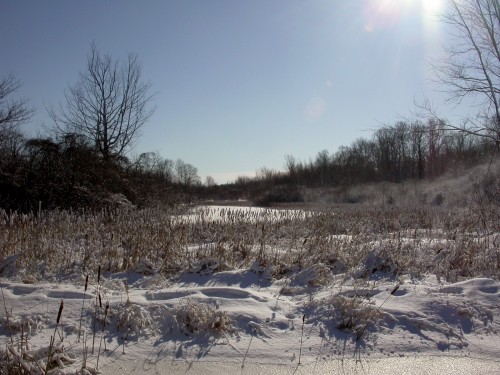|
|
|
WINTER
POPULATION MONITORING |
|
Weeks
10-13: January 2008 |
Welcome
to the McGill Bird Observatory weekly report. Click
here for a complete listing of our archives. Comments or questions are welcome at mbo@migrationresearch.org.
|
PICTURE OF
THE MONTH: |
|

Winter at MBO - a view south over frozen Stoneycroft Pond, from a
vantage point
beyond the C nets (Photo by Marcel
Gahbauer)
-
|
|
|
THIS MONTH |
THIS WINTER |
2008 TOTAL |
SITE TOTAL |
|
# birds (and species) banded |
- |
- |
- |
12978 (103) |
|
# birds (and species) repeat |
- |
- |
- |
2226 (59) |
|
# birds (and species) return |
- |
- |
- |
331 (29) |
|
# species observed |
13 |
39 |
13 |
191 |
|
# net hours |
- |
- |
- |
21945.8 |
|
# birds banded / 100 net hours |
- |
- |
- |
59.1 |
|
|
Note: table does not include nocturnal banding (owls) |
Banders-in-charge: Marie-Anne
Hudson
Censusers: Natalia Castellanos, Amélie Constantineau, Shawn
Craik, Kathleen Earl, Barbara Frei, Demetrios Kobiliris, Barbara and Don
MacDuff, Sabrina Richard-Lalonde
Notes: This January has been a mess weather-wise:
warm, cold, snow, rain, ice pellets, sunshine, windy, calm. This month
has run the gamut of foul weather, reducing the number of nice census
days. We’re hoping that the foul weather will play itself out
completely, leaving spring beautiful, warm, and perfect for banding!
New
species for this winter include Common Raven and Cedar Waxwing. In
terms of new species for the year, well they’re all new! We start 2008
with 13 species, including: Red-tailed Hawk, Downy and Hairy Woodpecker,
Blue Jay, American Crow, Common Raven, Black-capped Chickadee,
White-breasted Nuthatch, American Robin, Cedar Waxwing, European
Starling, Northern Cardinal and American Goldfinch.
We’ve
put up a few feeders near the gate (in the clearing just up the hill)
since the McGill Ethology class had a good amount of leftover seed from
a behavioural lab they were conducting. We thank them for their
generosity, as do the birds. Please feel free to go have a look to see
what’s there, and let us know if the seed level is getting low – we’re
hoping to have enough to get through the winter.
|

